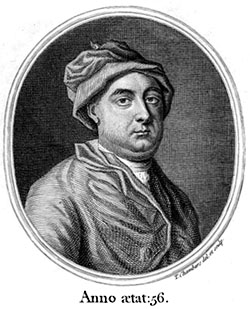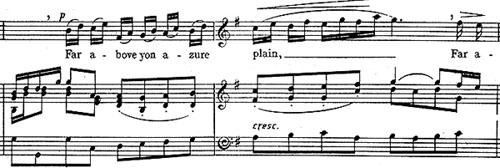A Perfect Morning
Today, a perfect morning. The University of Houston's College of Engineering presents this series about the machines that make our civilization run, and the people whose ingenuity created them.
The news this morning was no better than any other day. Suffering with us everywhere, contending politicians and commentators cherry-picking among the facts. Anger seemed ascendant. The sky, grim and overcast. And here I was, driving to work where, as they do in your workplace, troubles unexpectedly self-generate for no understandable reason.
 I needed to clear my head, so I turned on a CD -- tenor Mark Padmore and soprano Lucy Crowe singing pieces by Handel: the duet, As Steals the Morn upon the Night, written at the same time as Messiah. And Waft Her Angels from Handel's last opera, Jeptha. Something very strange happened as I listened. I suddenly saw the day through an entirely new lens.
I needed to clear my head, so I turned on a CD -- tenor Mark Padmore and soprano Lucy Crowe singing pieces by Handel: the duet, As Steals the Morn upon the Night, written at the same time as Messiah. And Waft Her Angels from Handel's last opera, Jeptha. Something very strange happened as I listened. I suddenly saw the day through an entirely new lens.
Are you familiar with Handel's arias and songs? You hear them in Messiah,of course; but Messiah is largely driven by a mood of drama and triumph. These pieces are much different. The impulse here is quiet resignation. Extraordinarily long, and profoundly gentle, melodic phrases weave into perfect sonorities. The message in this music is clear: All that noise going on out there is illusory -- come inside and claim your quiet. Let me read to you what a friend of the aging Handel had to say about him. It's a word-picture that explains both this music, and my visceral reaction to it.
[Handel] was impetuous, rough and peremptory in his manners and conversation, but totally devoid of ill-nature or malevolence; indeed, there was an original humour and pleasantry in his most lively sallies of anger or impatience, which, with his broken English, were extremely risible. ... Handel's general look was somewhat heavy and sour; but when he did smile, it was his sire the sun, bursting out of a black cloud.
So it is that evil drains out of the day, replaced by something else entirely. I've just left the warmth of the breakfast table -- the cats enjoying one another and us. The intense green of new growth rises in the gray overcast that created it. The intense heat of Houston's summer is muted. Handel's smile has indeed burst out of the cloud which I had so wrongly taken to be heavy and sour.
This strange trick of perspective is not unique to my morning ride to work. Sometimes I wonder if all of life is not one big optical illusion. Creativity is always a matter of seeing an old thing in a new way. It's Handel's friend looking at his sour face and seeing rays of the sun. It's looking at scorched rubber and inventing vulcanization. Or hearing a long musical phrase and realizing that we can ride it into a better day than the morning ever promised.
I'm John Lienhard, at the University of Houston, where we're interested in the way inventive minds work.
The CD (which I recommend) was: As Steals the Morn: Handel Arias & Scenes for Tenor. Mark Padmore, with Lucy Crowe and the English Concert directed by Andrew Manze, Harmonia Mundi USA, HMU 907422, Tracks 17 and 18.
The Handel image above, from John Mainwaring's 1760 biography of Handel, seems to bear out the word-portrait better than the many more well-known formal portraits.

(photo by jhl)

Two measures of "Waft Her, Angels, Through the Sky", from the opera Jeptha.